KN95 Respirator with HeadStraps – 20/Box
Login For Dealer Pricing
The DynaPro KN95 Respirator is a 5 laminate design that uses dual non woven and melt blown layers as well as a single hot air cotton layer. It is equipped with headstraps for a more secure and versatile harnessing mechanism and boasts filtration rates around 99% – well above the 95% level required for respirators of this class. Sold in a set of 20.
The DynaPro KN95 Respirator is a five laminate design, with dual non woven and melt blown layers as well as a single hot air cotton layer.
The first (outer) layer is made from non woven fabric.
The next two layers are made from melt blown fabric. These melt blown layers are the ones primarily responsible for the filtration performance of the respirator.
The fourth and fifth layers are made from hot air cotton and non woven material respectively.
The DynaPro KN95 measures 22cm x 16.5 cm (8.8 x 6.6 inches) unfolded. Folded dimensions are 11cm x 16.5cm (4.4 x 6.6 inches). Please see gallery photos for more information on these measurements.

What is a KN95 Respirator?
Filtration Standards
Both N95 and KN95 respirators must filter at least 95 percent of particles as small as 0.3 microns (hence the “95” in the name). This is the same as the standard to which N95 respirators are subject.
The standard for N95 masks has been set by the US National Institute For Occupational Safety & Health. The standard for KN95 respirators has been set by the equivalent body responsible for regulating these respirators in China. Although the two types of respirator are regulated by different bodies (one in the US, the other in China), the majority of both N95 and KN95 respirators are manufactured in China.
Fit Testing
The respirator will not provide an independent supply of oxygen but instead filters the surrounding air to provide a safe supply of oxygen for the wearer. To perform this job effectively, a KN95 respirator must create an effective seal around the face and nose while it is in use.
KN95 respirators must meet specific regulatory standards where fitting performance is concerned. The regulations require a minimum quality of air inside the respirator compared to that outside it. In addition, the regulations require that the mask maintain compliance with these standards after undergoing specific “actions” that are commonly applied to respirators in actual usage situations. For more details on these requirements, please see the “TIL performance criteria” described below for the DynaPro KN95 respirator.
Breathability
Both KN95 and N95 respirators are also required to comply with minimum requirements as to the air pressure differential between the outer and inner surfaces while they are in use.
The purpose of these requirements is to ensure that the user will not experience too much difficulty breathing while wearing the respirator. A high pressure differential means that regular air is unable to easily penetrate the respirator, making it difficult to breathe while wearing it. The respirator needs to allow the wearer to easily breathe safe air while blocking entry to harmful particles.
How Does A KN95 Compare To Other Types Of Facial Protection Devices?
Like a disposable face mask, the KN95 is a half piece respirator. This means that it protects only the lower half of the face. Specifically, it does not protect the upper part of the face (specifically, the eyes) from harmful particles or bacteria.
By contrast, a face shield provides full protection for all the facial mucous membranes – the eyes, nose and mouth.
However, most disposable face masks use only one layer of melt blown fabric instead of the 2 layers used by a KN95 respirator. This limits the filtration performance of a disposable face mask compared to a KN95 respirator. The same is true of disposable surgical masks.
Disposable face masks and face shields also do not provide an air tight fit against the face as do N95 and KN95 respirators.
How Does A KN95 Respirator Work?
As we have stated above, KN95 Respirators are designed to filter at least 95% of small particles with size 0.3 microns or larger. The respirators use multiple layers of non woven and melt blown fabric to keep airborne particles that are 0.3 microns or more in size from entering the wearer’s mouth or nose.
Key to the ability of a KN95 (or N95) respirator to filter harmful particles is its use of propylene as a component of the melt blown filtration layers. Propylene holds an electrostatic charge that helps it to trap harmful particles and prevent them getting through the respirator. This is similar to the effect you see when small pieces of lint cling to articles you have just removed from a dryer. The electrostatic charge stored by propylene enables it to trap small particles in the same way.
Many viral or bacterial particles (including the coronavirus) can be as small as 0.1 microns in size. However, these particles are usually transported on larger particles such as the droplets we emit while talking and breathing. By blocking these larger particles from entering the nose & mouth, the KN95 also prevents the entry of viral and bacterial particles.
Maintenance Of Your KN95
Unlike a face shield, a KN95 respirator does not have an unlimited life. To maximize the life of your respirator, we suggest the following precautions:
- Try to avoid touching its outside surfaces at all times;
- Always wash your hands thoroughly before you put on and remove your respirator;
- Provided you are not using it in a highly infectious environment, you can reuse the respirator. However, as we have warned above, its life is limited. Over the course of a few weeks, the filtering material of the respirator will deteriorate. As a result, we recommend that you change your KN95 respirator for a new one at intervals of no more than a month.
DynaPro KN95 Respirator – Features & Tested Performance Levels
Filtration Rate
The DynaPro KN95 is built to meet the GB2626-2006 executive standard. As with the NIOSH standard that governs the Almedic N95 and other N95 respirators, GB2626-2006 requires a filtration rate of 95% or more in relation to non oil 3 micron sized particles. Testing results for the DynaPro KN95 display filtration rates ranging between 99.6% and 99.8% for the 15 samples tested.
Ventilation Resistance
GB2626-2006 also requires inhalation and exhalation resistance levels of not more than 350 and 250 Pa respectively under an 85 L/min flow rate. These resistance levels indicate the ease with which the wearer of the respirator can breathe while wearing it. Testing results for the DynaPro KN95 Respirator show resistance levels under 150 Pa and 120 Pa respectively. These indicate that the DynaPro KN95 presents minimal breathing interference despite providing the high levels of filtration reported above.
Total Inward Leakage
The Total Inward Leakage (TIL) levels of the DynaPro KN95 are also well within GB2626-2006 standards. Total Inward Leakage refers to the total amount of contaminated air leaking through different parts of the respirator. These parts include the face seal. valves and gaskets (where present) and the filter itself.
The GB2626-2006 standard requires that, out of 50 “types of action”, the TIL of at least 46 should be under 11%. In addition, out of 10 tested samples, the TIL of at least 8 should be less than 8%.
Testers performed 50 types of action on 10 DynaPro KN95 Respirator samples. All resulted in TIL levels below 11%, with the highest recorded TIL being 6.0%. For the 10 samples tested, all recorded TIL levels were under 8%, with the highest recorded level at 5.6%
Among other things, TIL is a function of the effectiveness of the seal between the facial contours of the wearer and the edges of the respirator. It is important to note that respirators that conform to the NIOSH standard do not have to demonstrate any stated TIL levels.
Please refer to the tab titled “KN95 Test Report” on this page for the detailed test results.
DynaPro KN95 Respirator Design – Head Strap Harnessing
The DynaPro KN95 respirator uses a head strap harness.This is in contrast to the ear loop harness common among other KN95 respirators. In general, head straps result in a more effective seal than the earloop design. A recent NIOSH study has unearthed evidence indicating greater difficulty achieving a close fit when using an earloop harness.
Athough a respirator needs to have a high filtration rate to be effective, it is equally important that the seal around the contours of the face should be airtight to eliminate the risk of inward leakage of the 3-5 micron sized particles against which it needs to be effective.
A respirator that has a high filtration rate but that leaks around the face is not that more effective than one with a poor filtration rate. This is one of the design features that the TIL metric mentioned above takes into account.
In addition to the head strap design’s superior facial fit, it also results in a more comfortable wearing experience. The pressure of ear loops against the backs of the ears can become uncomfortable over extended wearing periods.
Nasal Splints
To further improve the closeness of its fit to the face, the DynaPro KN95 uses adjustable metallic nasal splints. These help to assure a contoured and secure fit to a wide variety of facial shapes.


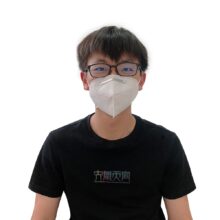
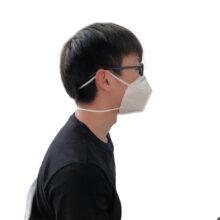
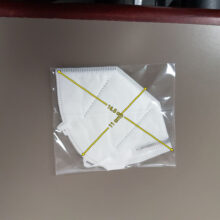
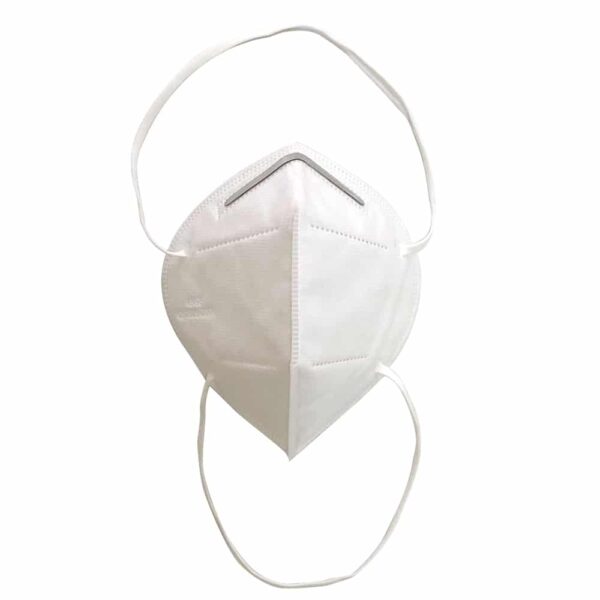



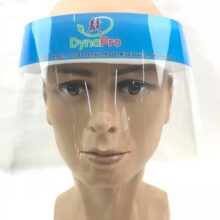
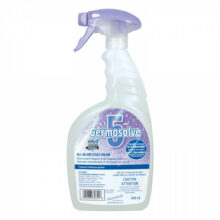

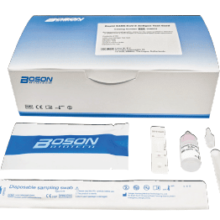
Susanna (Verified Owner) –
I bought these for my husband, and they fit well and he likes them. We have both tried many kinds — I am still looking!
Roxane Bouten (Verified Owner) –
The masks are very good, but too large for a woman. A smaller size would be very welcome.
Dunbar Medical –
Thanks for the review. They are actually the same size as the standard N95 mask. We have left some photos under Questions & Answers to demonstrate this.
Laura McGrath (Verified Owner) –
Fit is very good. Easy to breath in.